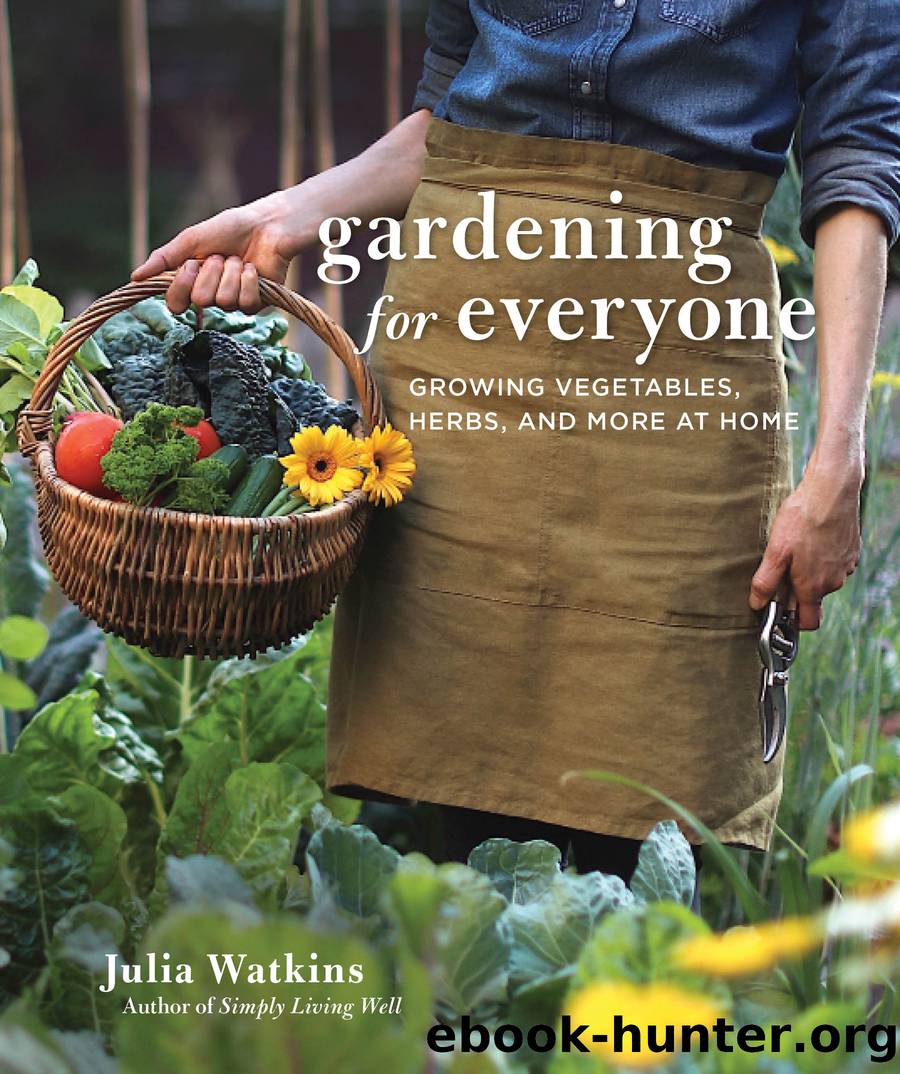Gardening for Everyone by Julia Watkins

Author:Julia Watkins
Language: eng
Format: epub
Publisher: HarperCollins
Published: 2022-01-29T00:00:00+00:00
Attracting Beneficial Organisms
Insects arenât the only beneficial organisms in the garden. If you avoid using pesticides and herbicides, your garden will become a living, thriving ecosystem, full of good bacteria, microorganisms, and worms in the earth, as well as arachnids, small critters, and birds above the soil line.
More than 90 percent of the living creatures in a healthy garden are beneficial to the plants growing there, and they work arduously to prey on the small percentage of organisms that are actually pests. Robins and thrushes eat caterpillars and snails; frogs and toads munch on slugs, pill bugs, and flies; snakes feast on rodents; and lizards feed on beetles and grasshoppers.
Like all living creatures, beneficial organisms have similar basic needs. They need food in order to reproduce and feed their offspring; shelter to raise their young and hide from predators; and water to stay hydrated and healthy. By providing these things, your garden can become an inviting home for them. Here are a few tips to help you turn your garden into a diverse community of beneficial organisms.
CONSIDER THE GARDEN AN ACTIVE ECOSYSTEM. Instead of focusing on battling bad bugs with chemical pesticides, switch your focus to creating a community of living organisms that establish a natural balance in your garden.
BUILD A HOUSE IN THE SOIL. One handful of healthy soil holds billions of different living organisms hard at work, making soil healthier while preying on nonbeneficial organisms. These bacteria, fungi, protozoa, mycorrhizae, earthworms, arthropods, and nematodes need food, shelter, and water too! The best way to meet their needs is to provide them with plenty of organic matter throughout the year.
PLANT THEIR FAVORITE FOODS. Plant pollinator-friendly plants that provide nectar and pollen to beneficial bugs and birds. Focus on native plants that have evolved with pollinators in your region. Nonnative plants may not provide pollinators with enough nectar or pollen or may be inedible to butterfly or moth caterpillars.
SET OUT FOOD FOR BIRDS. Landscape in and around the garden with plants that produce seeds and berries that mature at different times of the year. When cleaning the garden for fall or winter, leave the seed heads of annual and perennial flowers for birds to feed on during winter. Supplement naturally available food with commercial or homemade bird food to encourage birds to visit your garden year-round. Remember to keep feeders and tables clean so the birds stay healthy and disease-free.
CREATE SHELTER OR HABITAT FOR BENEFICIAL ORGANISMS. Beneficial organisms need places to feed, hide, reproduce, and overwinter. Consider creating borders of diverse vegetation with flowers, shrubs, and grasses. Build a garden pond as a home for frogs and toads. Create a wild area with piles of stones, logs, and leaves, where insects can nest and hibernate for the winter. Install wildlife homes and nesting boxes for frogs, birds, bats, and insects. Allow a dead tree stump to remain standing to provide a home for insects, rodents, and birds.
PROVIDE A WATER SOURCE. Provide a reliable source of clean water for birds, bees, and butterflies using saucers, birdbaths, fountains, or in-ground water features.
Download
This site does not store any files on its server. We only index and link to content provided by other sites. Please contact the content providers to delete copyright contents if any and email us, we'll remove relevant links or contents immediately.
Machine Learning at Scale with H2O by Gregory Keys | David Whiting(4313)
Never by Ken Follett(3955)
Fairy Tale by Stephen King(3396)
Will by Will Smith(2919)
Fantastic Beasts and Where to Find Them: The Original Screenplay by J. K. Rowling(2518)
It Starts With Us (It Ends with Us #2) by Colleen Hoover(2367)
Can't Hurt Me: Master Your Mind and Defy the Odds - Clean Edition by David Goggins(2339)
The Storyteller by Dave Grohl(2234)
Friends, Lovers, and the Big Terrible Thing by Matthew Perry(2230)
The Becoming by Nora Roberts(2201)
Cloud Cuckoo Land by Anthony Doerr(2110)
New Morning Mercies: A Daily Gospel Devotional by Paul David Tripp(1919)
A Short History of War by Jeremy Black(1848)
HBR's 10 Must Reads 2022 by Harvard Business Review(1843)
The Complete Witcher by Andrzej Sapkowski(1840)
Cytonic by Brandon Sanderson(1835)
Go Tell the Bees That I Am Gone by Diana Gabaldon(1757)
A Game of Thrones (The Illustrated Edition) by George R. R. Martin(1744)
Leviathan Falls (The Expanse Book 9) by James S. A. Corey(1743)
